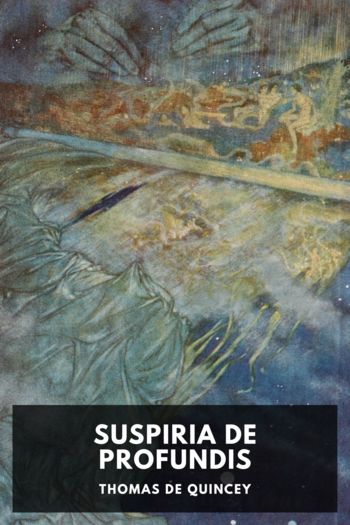Confessions of an English Opium-Eater, Thomas De Quincey [best books for students to read TXT] 📗

- Author: Thomas De Quincey
Book online «Confessions of an English Opium-Eater, Thomas De Quincey [best books for students to read TXT] 📗». Author Thomas De Quincey
But these troubles are past; and thou wilt read records of a period so dolorous to us both as the legend of some hideous dream that can return no more. Meantime, I am again in London, and again I pace the terraces of Oxford Street by night; and oftentimes, when I am oppressed by anxieties that demand all my philosophy and the comfort of thy presence to support, and yet remember that I am separated from thee by three hundred miles and the length of three dreary months, I look up the streets that run northwards from Oxford Street, upon moonlight nights, and recollect my youthful ejaculation of anguish; and remembering that thou art sitting alone in that same valley, and mistress of that very house to which my heart turned in its blindness nineteen years ago, I think that, though blind indeed, and scattered to the winds of late, the promptings of my heart may yet have had reference to a remoter time, and may be justified if read in another meaning; and if I could allow myself to descend again to the impotent wishes of childhood, I should again say to myself, as I look to the North, “Oh, that I had the wings of a dove—” and with how just a confidence in thy good and gracious nature might I add the other half of my early ejaculation—“And that way I would fly for comfort!”
The Pleasures of OpiumIt is so long since I first took opium that if it had been a trifling incident in my life I might have forgotten its date; but cardinal events are not to be forgotten, and from circumstances connected with it I remember that it must be referred to the autumn of 1804. During that season I was in London, having come thither for the first time since my entrance at college. And my introduction to opium arose in the following way. From an early age I had been accustomed to wash my head in cold water at least once a day: being suddenly seized with toothache, I attributed it to some relaxation caused by an accidental intermission of that practice, jumped out of bed, plunged my head into a basin of cold water, and with hair thus wetted went to sleep. The next morning, as I need hardly say, I awoke with excruciating rheumatic pains of the head and face, from which I had hardly any respite for about twenty days. On the twenty-first day I think it was, and on a Sunday, that I went out into the streets, rather to run away, if possible, from my torments, than with any distinct purpose. By accident I met a college acquaintance, who recommended opium. Opium! dread agent of unimaginable pleasure and pain! I had heard of it as I had of manna or of ambrosia, but no further. How unmeaning a sound was it at that time: what solemn chords does it now strike upon my heart! what heart-quaking vibrations of sad and happy remembrances! Reverting for a moment to these, I feel a mystic importance attached to the minutest circumstances connected with the place and the time and the man (if man he was) that first laid open to me the Paradise of Opium-eaters. It was a Sunday afternoon, wet and cheerless: and a duller spectacle this earth of ours has not to show than a rainy Sunday in London. My road homewards lay through Oxford Street; and near “the stately Pantheon” (as Mr. Wordsworth has obligingly called it) I saw a druggist’s shop. The druggist—unconscious minister of celestial pleasures!—as if in sympathy with the rainy Sunday, looked dull and stupid, just as any mortal druggist might be expected to look on a Sunday; and when I asked for the tincture of opium, he gave it to me as any other man might do, and furthermore, out of my shilling returned me what seemed to be real copper halfpence, taken out of a real wooden drawer. Nevertheless, in spite of such indications of humanity, he has ever since existed in my mind as the beatific vision of an immortal druggist, sent down to earth on a special mission to myself. And it confirms me in this way of considering him, that when I next came up to London I sought him near the stately Pantheon, and found him not; and thus to me, who knew not his name (if indeed he had one), he seemed rather to have vanished





Comments (0)